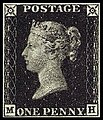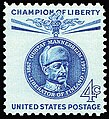Portal:Philately
| Philately portal | WikiProject Philately |
The Philately Portal
Philately is the study of revenue or postage stamps. This includes the design, production, and uses of stamps after they are issued. A postage stamp is evidence of pre-paying a fee for postal services. Postal history is the study of postal systems of the past. It includes the study of rates charged, routes followed, and special handling of letters.
Stamp collecting is the collecting of postage stamps and related objects, such as covers (envelopes, postcards or parcels with stamps affixed). It is one of the world's most popular hobbies, with estimates of the number of collectors ranging up to 20 million in the United States alone.
A Canadian postal code (French: code postal) is a six-character string that forms part of a postal address in Canada. Like British, Irish, Dutch, and Argentinian postcodes, Canada's postal codes are alphanumeric. They are in the format A1A 1A1, where A is a letter and 1 is a digit, with a space separating the third and fourth characters. As of October 2019, there were 876,445 postal codes, using forward sortation areas (FSAs), from A0A in Newfoundland to Y1A in Yukon.
Canada Post provides a postal code look-up tool on its website and via its mobile application, and sells hard-copy directories and CD-ROMs. Many vendors also sell validation tools, which allow customers to properly match addresses and postal codes. Hard-copy directories can also be consulted in all post offices, and some libraries. (Full article...)
Selected article -
The General Post Office (GPO) was the state postal system and telecommunications carrier of the United Kingdom until 1969. Established in England in the 17th century, the GPO was a state monopoly covering the dispatch of items from a specific sender to a specific receiver (which was to be of great importance when new forms of communication were invented); it was overseen by a Government minister, the Postmaster General. Over time its remit was extended to Scotland and Ireland, and across parts of the British Empire.
The GPO was abolished by the Post Office Act 1969, which transferred its assets to the Post Office, so changing it from a Department of State to a statutory corporation. Responsibility for telecommunications was given to Post Office Telecommunications, the successor of the GPO Telegraph and Telephones department. In 1980, the telecommunications and postal sides were split prior to British Telecommunications' conversion into a totally separate publicly owned corporation the following year as a result of the British Telecommunications Act 1981. In 1986 the Post Office Counters business was made functionally separate from Royal Mail Letters and Royal Mail Parcels (the latter being later rebranded as 'Parcelforce'). At the start of the 21st century the Post Office became a public limited company (initially called 'Consignia plc'), which was renamed 'Royal Mail Group plc' in 2002. In 2012 the counters business (known as 'Post Office Limited' since 2002) was taken out of Royal Mail Group, prior to the latter's privatisation in 2013. The privatised holding company (Royal Mail plc) was renamed International Distributions Services plc in 2022. (Full article...)
Selected images
Did you know (auto-generated)

- ... that Amrita Sher-Gil's painting Hill Women appeared on a 1978 Indian postage stamp?
- ... that after Irish post office clerk Maureen Flavin Sweeney reported worsening weather conditions, Dwight D. Eisenhower agreed to postpone D-Day by 24 hours?
- ... that working at a post office was how Derrick Harden became an NFL player?
- ... that James Diossa rescued the only public library and post office in Central Falls, Rhode Island, when the city went into bankruptcy?
General images -
Selected stamp -
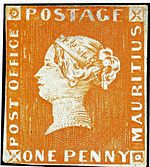

The Mauritius "Post Office" stamps were issued by the British Colony Mauritius in September 1847, in two denominations: an orange-red one penny (1d) and a deep blue two pence (2d). Their name comes from the wording on the stamps reading "Post Office", which was soon changed in the next issue to "Post Paid". They are among the rarest postage stamps in the world. (Full article...)
List articles

- List of philatelists
- List of most expensive philatelic items
- List of postage stamps
- Lists of people on postage stamps (article) • (Category page)
- List of entities that have issued postage stamps (A–E)
- List of entities that have issued postage stamps (F–L)
- List of entities that have issued postage stamps (M–Z)
- List of postal services abroad
- Timeline of postal history
Related portals
Topics
Categories
WikiProject
![]() WikiProject Philately organizes the development of articles relating to philately. For those who want to skip ahead to the smaller articles, the WikiProject also maintains a list of articles in need of improvement or that need to be started. There are also many red inked topics that need to be started on the list of philatelic topics page.
WikiProject Philately organizes the development of articles relating to philately. For those who want to skip ahead to the smaller articles, the WikiProject also maintains a list of articles in need of improvement or that need to be started. There are also many red inked topics that need to be started on the list of philatelic topics page.
Selected works
- Williams, Louis N., & Williams, Maurice (1990). Fundamentals of Philately {revised ed.). American Philatelic Society. ISBN 0-9335-8013-4.
{{cite book}}: CS1 maint: multiple names: authors list (link) - Hornung, Otto (1970). The Illustrated Encyclopedia of Stamp Collecting. Hamlyn. ISBN 0-600-01797-4.
- Stuart Rossiter & John Fowler (1991). World History Stamp Atlas (reprint ed.). pub: Black Cat. ISBN 0-7481-0309-0.
Wikimedia
The following Wikimedia Foundation sister projects provide more on this subject:
-
Commons
Free media repository -
Wikibooks
Free textbooks and manuals -
Wikidata
Free knowledge base -
Wikinews
Free-content news -
Wikiquote
Collection of quotations -
Wikisource
Free-content library -
Wikiversity
Free learning tools
Other Portals
Sources
- ^ "Philatelic Collections: General Collections". British Library. 2003-11-30. Archived from the original on 30 June 2011. Retrieved 2011-01-16.







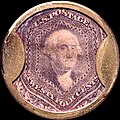



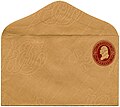
![Image 8Unissued 1956 £1 Jamaican chocolate and violet, the first stamp designed for Queen Elizabeth II. Held in the British Library Crown Agents Collection.[1]](http://upload.wikimedia.org/wikipedia/commons/thumb/9/9b/Stamp_Jamaica_1956_unissued_1sh.jpg/120px-Stamp_Jamaica_1956_unissued_1sh.jpg)










